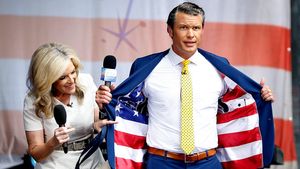Despite winning big at this year's annual Cannes Film Festival, there's something disturbing about Girl, director Lukas Dhont's Belgian drama film that chronicles a transgender teen chasing her dream of becoming a ballerina: the movie is only the latest to cast a cisgender male in the role of a transgender female.
Although casting cis men as trans women has been done countless times in numerous films, it's a practice that needs to stop, especially considering how underrepresented trans actors already are in film and other media.
Besides winning the Queer Palm award at Cannes, Girl has also been getting praised by so many cisgender film critics. I highly doubt few, if any, transgender critics had an opportunity to see it. It's one of the troubles that come with attending a film festival that takes place in a foreign country. (Cannes isn't a cheap film festival to attend for those of us in the states, let alone those of us with low income.)
When one examines the reviews published in huge, mainstream trades like Varietyand The Hollywood Reporter, both were written by cis men.
Variety's Peter Debruge writes:
In simple, unambiguous terms, Dhont delivers an intuitively accessible look at a gender nonconforming teenager trying to find the courage to be herself, relying on a stunning central performance from 15-year-old Victor Polster in which the cisgender thesp pulls off a remarkable transformation that, in the same year "A Fantastic Woman" won the foreign language Oscar, could rile those who insist that such roles go to nonbinary actors.
If we know a character is transgender, we needn't label them as gender-nonconforming. More over, non-binary actors don't identify with either gender.
THR's Boyd van Hoeij (who did find some fault within the film's focus on nudity and reducing the transgender experience to genitals) writes:
One thing that perhaps a part of the transgender community will look at more closely is Dhont’s decision to cast a cisgender boy in the role, though it might be next to impossible to find a transgender actor to play a pre-op girl who is the right age and who can also act and is a trained ballet dancer.
Very few reviews of Girl have touched on the fact that a transgender actor isn't playing the role, but one piece from IndieWire's David Ehrlich does manage to take the film to task for not casting trans:
In an industry where straights play gays, gays play straights, and most see through the bullshit of strictly binary genders anyway, some people (and critics) were slow to recognize the pain caused by the casting in "socially progressive" movies like "Dallas Buyers Club" and "The Danish Girl." After all, who needs transgender actors when you have Jared Leto? But times change, people wise up, and it’s becoming understood that — no matter how well intentioned a film might be — it’s dangerous and self-defeating for a work to obscure the same group of people that it’s ostensibly trying to push into the spotlight, particularly when those people are often relegated to the darkness.
According to Ehrlich's piece, cisgender actor Victor Polster responded to "a gender-blind casting call that was seeking a passably femme 15-year-old ballet phenom." The fact that Ehrlich calls out the film's casting is admirable, and is more than what can be said about other cisgender film critics.
Were female film critics not available? What about transgender critics? There are a number of us in existence. The problem is that we don't get the same opportunities.
I'm reminded of an article I wrote last year on what can be done to improve transgender representation in the media. This came when Anything was sucking all the air out of the room because of casting Matt Bomer as a transgender woman. Meanwhile, And Then There Was Eve, a film starring Rachel Crowl in a leading role, got virtually no press in the LGBT media despite having a trans actress in a trans role.
There's still a lot of work to be done. I get into it regularly on Twitter with other film critics who just can't seem to understand the importance of casting transgender people in transgender roles. The casting of cisgender men as women leads to the frequent stereotype that transgender women are nothing more than men in dresses.
We're more than that—and it needs to stop.






























































































































